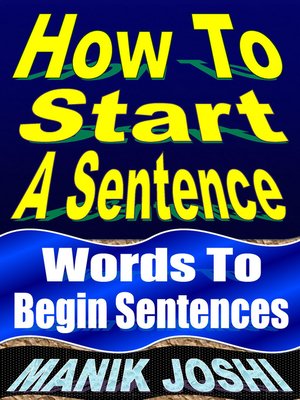
Sign up to save your library
With an OverDrive account, you can save your favorite libraries for at-a-glance information about availability. Find out more about OverDrive accounts.
Find this title in Libby, the library reading app by OverDrive.



Search for a digital library with this title
Title found at these libraries:
| Library Name | Distance |
|---|---|
| Loading... |
This Book Covers The Following Topics:
How to Start a Sentence
Using 'AS'
Using 'AFTER' and 'BEFORE'
Using 'AT'
Using 'BY'
Using 'FOR/FROM
Using 'IF'
Using 'OF/ON/OUT'
Using 'TO'
Using 'IN'
Using 'WITH'
Using 'WH-WORDS'
'Asking Questions'
Using 'VERB WORD'
Using 'ING' FORM of VERBS
Using 'PAST PARTICIPLES'
Using '-LY Words'
Using 'PRONOUNS'
Transitional Expressions
Miscellaneous
Exercises: 1(A) and 1(B)
Exercises: 2(A) and 2(B)
Sample This:
There are different ways to start a sentence in English. Using pronouns (I, we, you, they, he, she, it) is the most popular way to begin a sentence. But there are many other words that are widely used to start a sentence. They might be question words (what, where, etc.). They might be words formed from verbs, ending in –ing, -ed, -en, etc. Besides, words such as 'to' 'in' 'with', 'if', 'after' are also used to begin a sentence.
Here, you will learn various words and phrases to start a sentence with.
Important Note:
Starting a sentence with 'and' or 'but' is correct or not!
Using 'And' or 'But' to begin a sentence is generally considered grammatically Incorrect. But there is no hard and fast rule in this regard. So, you can use 'And' or 'But' to begin a sentence. But avoid excessive use of these words to begin a sentence. Use these words at the beginning of a sentence only when they really give strength to your language.
Note: It is said that a sentence should not be begun with a conjunction of any kind, especially one of the FANBOYS (for, and, nor, but, or, yet, so). But this is not a hard and fast rule. Particularly in spoken English, starting a sentence with 'And' or 'But' is common.
01. AS (used in place of 'when'; while something else is happening)
As a person ages, his body weakens physically.
As another year draws to a close, our attention turns to a new year.
As news of PM's hospitalization spread, fans and admirers began lining up outside the hospital.
As the summer season approaches, I look forward to eating ice-creams.
As the day progressed, over a hundred protestors gathered at the office.
As the situation in the town worsened, jittery people rushed back to their homes.
As the train pulled into the station, passengers rushed towards it.
As the war widened, they had to leave the city.
As we grow older, we are more in control of our lives.
As we progress, it is going to become more and more difficult.
02. AS (used in place of 'because')
As a policeman myself, I am aware of all the laws.
As he got busy, his wife picked up the son.
As sanitary workers are absent on most of the days, sweeping of roads is also irregular resulting in the trash along the road.
As the electric cables are hanging loosely, it may anytime lead to a major accident if any passer-by comes into contact.
As the night temperature rose owing to the cloudy sky, there was some respite from cold conditions.
03. AS (used in place of 'like')
As a great poet, he played with words.
As in the past, the party president distanced herself from the government's unpopular decision.
04. AS (used to introduce two events happening at the same time)
As the bus was nearing, he moved aside.
As the forces were conducting searches, the militants fired upon them, triggering an encounter.
As the mercury levels are dropping each day, difficulties for the poor are constantly rising.
05. AS (used to add information)
As you know, I have sent him a letter.
06. AS (used to show 'in the...







